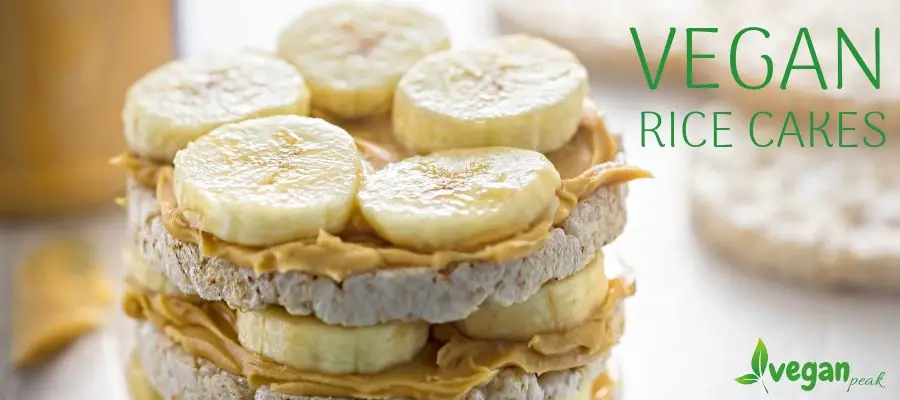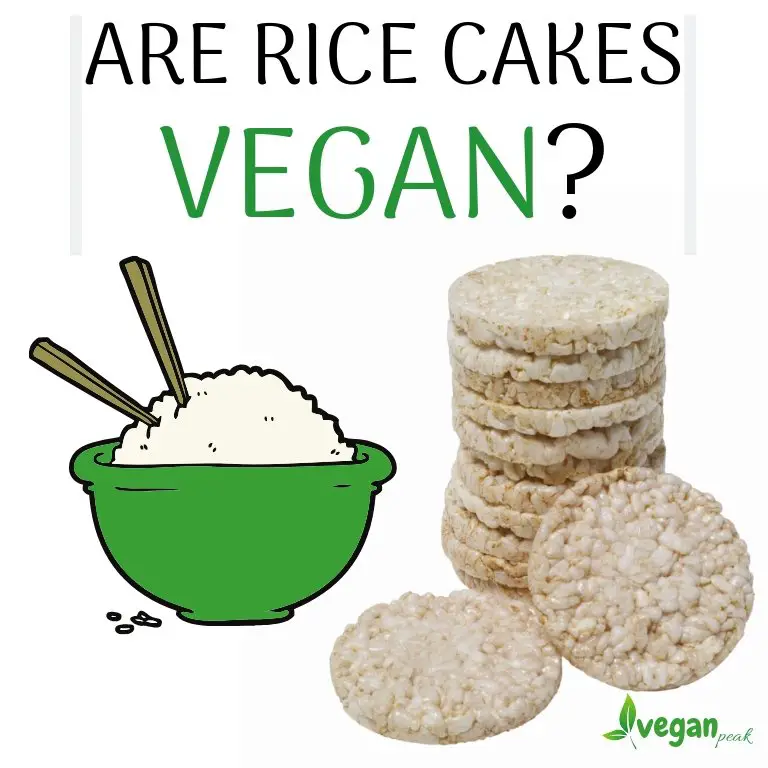We all need some snacks once in a while, and rice cakes are both tasty and healthy, but are rice cakes vegan and gluten-free?
There are many vegan options when it comes to rice cakes. That’s because most traditional rice cakes use simple ingredients. However, rice cakes are becoming more popular in recent times, which means more flavors. There’s an impressive amount of rice cakes flavors, but not all are vegan. Many of the more exotic flavors contain dairy, eggs, or even animal fats. It’s essential to avoid these as a vegan. Luckily, it’s rather simple to avoid as most simple flavors are entirely vegan in all regards. So, there are quite a few options out there, but you need to be cautious. The same goes for the gluten-free as many rice cakes contain traces of gluten. It’s usually because they are produced alongside products that have gluten. Meaning you need to opt for the options that specifically say gluten-free.
So let’s take a closer look at which rice cakes you can eat and which you should avoid. Learn how to distinguish vegan from non-vegan rice cakes and what to avoid on a gluten-free diet. I will also provide a list of my favorite vegan rice cakes, so read through!
Are Rice Cakes Vegan?
The short answer to this question is yes. In general, rice cakes contain rice and a few other animal-based ingredients to form the cake that can be used for snacking and even meals. This food is a staple in many vegan diets and also safe for people who have many of the common allergies as well.
However, with the new interest in rice cakes, some of the more modern varieties and flavors may not necessarily be vegan anymore. A plain rice cake is a safe choice. Always read the ingredient list before purchasing, however. The vegan label is usually present as well. This label is a simple way to identify foods that vegans can eat without problems.
Which Rice Cakes Are Not Vegan?

The newer varieties of rice cakes may not be vegan. Some of the cheese-flavored cakes can contain dairy products. The ingredient label will list milk, although it may contain words such as “whey” or casein.” These are components of milk and indicate that an animal product has been used in the rice cake. The product may also say that it contains milk or possibly eggs since these are common allergens. With any flavors that include cheese in the label, likely, they will not be vegan.
Flavors that are traditionally associated with meat such as barbeque may also contain some type of animal product. Once again, read the label to check. If it’s unclear whether the product is vegan or not, it may be best to contact the company directly. A simple inquiry is an effective way to learn whether the product is safe for vegans to have.
Finally, keep in mind that products will change over time. Changes in food supplies often cause companies to change ingredients. Although most vegans have certain staple foods that they know are safe, take the time to check the label of these foods periodically. In general, a rice cake should be a vegan-allowed food choice.
–Click Here to See My Favorite Vegan Rice Cakes
Are Rice Cakes Gluten Free?
As many people assume, rice cakes seem like a gluten-free product. After all, they should contain rice as the primary ingredient. Gluten doesn’t seem like it’s necessary.
Gluten is a protein that’s found in wheat, barley, and rye. It can sometimes be present in oats. For anyone intolerant to gluten, ingesting this product leads to intestinal damage and long-term harm. Avoiding even small amounts of gluten remains essential for individuals with Celiac disease and may be necessary for other sensitivities as well.
When shopping around for rice cakes, always read the ingredient label to determine if gluten is present in the list. Most plain rice cakes will not contain gluten and may have a gluten-free label present. This means that they are safe to consume without concern for gluten. It’s a good idea to look for the gluten-free label on rice cakes. Since they may be manufactured in the same plant as gluten-containing products, some rice cakes still contain gluten as a contaminant. To have a gluten-free label, products must contain less than 20 parts per million of gluten.
Gluten-free cakes that are flavored may contain gluten as an additive. Some cheese or other flavoring powders contain gluten as an anti-clumping additive. The amount of gluten is usually small but can be a problem.
How to know if Rice Cakes Are Gluten-Free?
For consumers who may be concerned about gluten and want to try rice cakes that don’t expressly state gluten-free, contact the company directly. Most companies have a direct customer service line or email address. Do this for any rice cake that may contain gluten as an ingredient even though it’s not explicitly stated. Gluten can be present in additives such as “natural flavors” or present if the cakes are made in a plant that produces bread or wheat products. The customer service department should be able to confirm either the presence or absence of gluten promptly.
When in doubt, it’s best to avoid any products that may contain gluten, especially if you have celiac disease. Since it can take years to heal from gluten ingestion, even a small amount can be problematic. In general, rice cakes are gluten-free. However, look for cakes that have the gluten-free label on them to be on the safe side. This will allow you to purchase cakes for yourself or others with confidence.
Conclusion
So there you have it! There are many kinds of rice cakes that vegans and gluten-intolerant can eat without issue. However, there are still a few things to consider with rice cakes. Some ingredients might seem harmless, but contain traces or even a lot of animal products. The same goes for gluten. The problem with gluten is that it’s often hard to know for sure whether or not it’s present. So for that reason, I encourage you to look for rice cakes explicitly saying “gluten-free.” It might also be best to check the backside to make sure it’s not produced alongside gluten products.

Hey, I’m Gus! I have been vegan for quite some years now, and have collected a lot of knowledge about the subject in this time. My goal with this blog is to spread the vegan message and make it easy to know exactly what’s vegan and what’s not.
